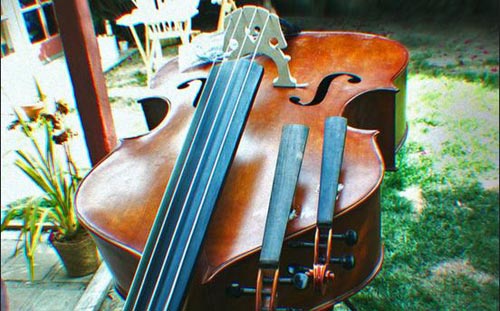Interview with Sound Artist Diego Stocco

Italian artist Diego Stocco builds sound. Last year he unveiled The Burning Piano in which he ritually murdered a €200 piano by setting it alight and plinking out its last notes as it burned. Lately he's been more constructive, building musical instruments for original scores. He spoke to Cool Hunting earlier this week.
One of the most fascinating parts of your work is that you build your own instruments out of every day things lying around the house. How much are they tailored to create a specific sound you want and how much is the process a spontaneous discovery of whatever it turns out to be?
It's mostly a spontaneous process, some objects are more "musical" than others, meaning that they have a recognizable tuned tone that can be recorded and expanded. This was the case when I created Luminosonic, which is an entire composition made with light bulb sounds. Other objects or materials can have sounds hidden under layers of noise, like Music From Sand. After various experiments I found several ways to shape sounds out of things that apparently seem not that interesting. Regarding the more complex instruments that I build the process is a bit different, in that case I need to figure out how the instrument will actually work, tuned and played.
How long have you been doing scores for video games?
I started recently, I've been working mainly in films and TV before. My music has been used for several video game trailers but my first full score for a video game is the one I did for “The Conduitâ€.
How do you feel about these games as a medium for your work? Do you see games as supplanting the entertainment role of films in our popular culture or are they just another throw-away consumer product?
Films and video games are different forms of entertainment, I don't see one excluding the other. Games are interactive and the story can evolve based on the choices made by the player. Also the music can move forward based on that interaction and change its structure. In a film, once the music is approved, is not going to change. If I'm working on a video game I'm focusing on creating music with different modules that can connect together in more than one way. Based on the size of the market and the increasing interest revolving around new releases I think video games are already an established reality with a precise cultural role.
Do you compose a score beforehand and then set out to perform it with your instruments? Or do the notes come after you've created the instruments themselves?
Continue reading and see more images after the jump.
The music always come after I built the instrument, it’s the sound that inspires the piece. When I’m building them I already have a clear idea of the result I want to obtain but it’s only when the instrument or the sound is ready that I can really play it and feel what sounds better.
Your video pieces have are impressively stylistic. Have you ever considered a live performance? Perhaps a collaboration with a visual artist?
I thought about it but never had a chance to put something together. It would be cool to create an interactive piece based on sounds and images, I have some ideas in my sketchbook. We'll see in the future.
What can we look forward to seeing next?
I'm working on a new instrument, I had an idea that I wanted to try, it's coming together well but I still have to work on some details. I'll make a video to show it. Besides this I recently finished the third volume of Epic Textures, massive sounding music for film and video game trailers that I produced for a company called Epic Score. You can listen to demos of the first two volumes on my website. I think it's going to be out soon.
Is there anything else you wanted to share about your work?
I started to release some of my albums on Bandcamp, I have a couple of albums up now. "Cold Cornflakes" Suite for Unprepared Piano is a suite of 6 pieces where I remixed my own piano performances, altering the natural sound of the piano in different ways, but without loosing the original character, so it still sound organic and not electronic. The other one is called "The Broken Suite" and it's dark sounding music with low tempos and heavy drums. This album contains more electronic sounds but also a good amount of processed organic sounds. They are available here.











